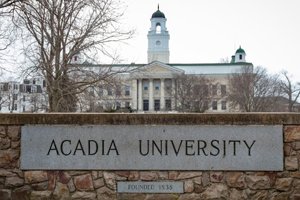Acadia University is in tiny Wolfville, Study In Acadia University, Acadia University fees, Acadia University course list, Acadia University Ranking, Courses, Fees. Study In Acadia University, Acadia University course list, Acadia University Fees, Acadia University College Canada, Acadia University Canada Study In Acadia University, Acadia University fees, Acadia University course list, Acadia University Ranking, Courses, Fees.
Acadia University
Countries
Visitors
Visa Granted
Subjects
Acadia University – Description
Established in 1838, Acadia University is a highly-ranked liberal arts university in Nova Scotia, Canada. Set up as Horton Academy in 1828, the university was an extension of a Horton-based institution. Through the years, the institution’s name was changed several times: Queen’s College in 1838 and Acadia College in 1841. The college started operating in 1839 with 21 students and two faculty members and adopted its current name in 1891. It has affiliations from the Canadian University Society for Intercollegiate Debate (CUSID) and the International Association of Universities (IAU).
Nestled in Annapolis Valley of Wolfville, the 250-acre campus of the university features world-class academic, administrative, recreational and housing facilities. The university library holds an extensive and unique collection of print, digital and multimedia resources. It offers group and individual study spaces along with facilities like scanning, photocopying and printing. Athletic facilities on the campus include a swimming pool, dance studio, cardio centre, fitness centre, football field, two gymnasiums, squash and racquetball courts, walking tracks and tennis courts. Over 1600 students stay in 12 on-site residences offering options like high-rise, heritage, double sharing rooms and deluxe suites equipped with modern amenities. Facilities offered to students include local phone service, high-speed Internet, housekeeping and in-house laundry. Other on-campus facilities include a convenience store, medical centre, student lounge and two food outlets.
The academic structure of Acadia University is divided into four faculties – Theology, Pure and Applied Science, Arts and Professional Studies. Each faculty further sub-divides into various schools and departments specialized in different areas of teaching and research. It offers about 200 programmes in business, education, music, engineering, applied sciences, history, theology, gender studies, theatre and economics. The university has a separate Division of Research and Graduate Studies that supervises the research programmes and graduate students. It has six research chairs and about 15 research centres equipped with techno-scientific equipment and modern facilities. Open Acadia offers distance learning and correspondence courses for working professionals.

campus
The university has over 70 clubs and organizations that focus on different interests and recreational activities. Additionally, it has 11 varsity teams, known as the Axewomen and Axemen that participate in various events and competitions at the intercollegiate level. Acadia University is an ethnically close-knit community with 3,574 students and 255 faculty members from 60 different countries of the world. International students make up 11% of the entire student body. With a class size of 28 or fewer students, the student-faculty ratio at Acadia is 14:1.
Acadia University possesses a comprehensive list of alumni who are successful leaders in their respective domains. Notable names in the alumni list are Edgar Archibald (Politician and Scientist), Norman Atkins (Canadian Senator), Ron Barkhouse (Professor), Dalton Camp (Politician and Journalist), Paul Corkum (Physicist), Michael Dick (Journalist), Dale Frail (Astronomer), William Feindel (Neurosurgeon), Mark Day (Actor), Joanne Kelly (Actress), Alexandra Fuller (Writer), Paul Masotti (Footballer), Rob Ramsay (Actor), Gary Graham (Musician), Bob Cameron (Footballer), Heather Rankin (Lyricist and Singer), Lorie Kane (Golfer) and Kenneth Colin Irving (Businessman).
Acadia University Course List
ELIGIBILITY CRITERIA IN GENERAL

COUNTRIES
Quick Links


